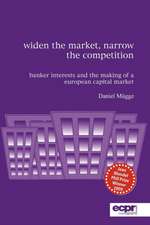Global Financial Integration Thirty Years On: From Reform to Crisis
Editat de Geoffrey R. D. Underhill, Jasper Blom, Daniel Müggeen Limba Engleză Paperback – 29 aug 2012
| Toate formatele și edițiile | Preț | Express |
|---|---|---|
| Paperback (1) | 323.27 lei 6-8 săpt. | |
| Cambridge University Press – 29 aug 2012 | 323.27 lei 6-8 săpt. | |
| Hardback (1) | 635.44 lei 6-8 săpt. | |
| Cambridge University Press – sep 2010 | 635.44 lei 6-8 săpt. |
Preț: 323.27 lei
Nou
Puncte Express: 485
Preț estimativ în valută:
61.87€ • 63.76$ • 52.24£
61.87€ • 63.76$ • 52.24£
Carte tipărită la comandă
Livrare economică 03-17 martie
Preluare comenzi: 021 569.72.76
Specificații
ISBN-13: 9781107406902
ISBN-10: 1107406900
Pagini: 376
Dimensiuni: 152 x 229 x 21 mm
Greutate: 0.55 kg
Editura: Cambridge University Press
Colecția Cambridge University Press
Locul publicării:New York, United States
ISBN-10: 1107406900
Pagini: 376
Dimensiuni: 152 x 229 x 21 mm
Greutate: 0.55 kg
Editura: Cambridge University Press
Colecția Cambridge University Press
Locul publicării:New York, United States
Cuprins
Introduction: the challenges and prospects of global financial integration Geoffrey R. D. Underhill, Jasper Blom and Daniel Mügge; Part I. History and Context: Input, Output and the Current Architecture (Whence it Came): 1. Financial governance in historical perspective: lessons from the 1920s Randall Germain; 2. Between the storms: patterns in global financial governance 2001–7 Eric Helleiner and Stefano Pagliari; 3. Deliberative international financial governance and apex policy forums: where we are and where we should be headed Andrew Baker; 4. Finance, globalisation and economic development: the role of institutions Danny Cassimon, Panicos Demetriades and Björn Van Campenhout; Part II. Assessing the Current Financial Architecture (How Well Does it Work?): 5. Adopting international financial standards in Asia: convergence or divergence in the global political economy Andrew Walter; 6. The political economy of Basel II in the international financial architecture Stijn Claessens and Geoffrey R. D. Underhill; 7. The catalytic approach to debt workout in practice: coordination failure between the IMF, the Paris Club and official creditors Eelke de Jong and Koen van der Veer; 8. Empirical evidence on the new international aid architecture Stijn Claessens, Danny Cassimon and Björn van Campenhout; 9. Who governs and why? The making of a global anti-money laundering regime Eleni Tsingou; 10. Brazil and Argentina in the global financial system: contrasting approaches to development and foreign debt Victor Klagsbrunn; 11. Global markets, national alliances and financial transformations in East Asia Xiaoke Zhang; Part III. What Does the Future Hold? Reactions to the Current Regime and Prospects for Progress (Where is it Going?): 12. Changing transatlantic financial regulatory relations at the turn of the millennium Elliot Posner; 13. Monetary and financial co-operation in Asia: improving legitimacy and effectiveness? Heribert Dieter; 14. From microcredit to microfinance to inclusive finance: a response to global financial openness Brigitte Young; 15. Combating pro-cyclicality in the international financial architecture: towards development-friendly financial governance José Ocampo and Stephany Griffith-Jones; 16. Public interest, national diversity and global financial governance Geoffrey R. D. Underhill and Xiaoke Zhang; Conclusion: whither global financial governance after the crisis? Daniel Mügge, Jasper Blom and Geoffrey R. D. Underhill.
Recenzii
Review of the hardback: 'Amidst the flurry of commentary provoked by the global financial crisis, this impressive collection of essays stands out for both the breadth of its coverage and the depth of its analysis. The editors have brought together an outstanding group of scholars to address the challenge of financial governance today, with the linked issues of effectiveness and legitimacy taking center stage. The book is a must read.' Benjamin J. Cohen, Louis G. Lancaster Professor of International Political Economy, University of California, Santa Barbara
Review of the hardback: 'Written in the midst of an emergency that nearly brought down the global economy, the chapters in this timely and cohesive book range widely over a vital arena where the legitimacy and effectiveness of key policies are now highly debatable. The editors gathered many of the world's best analysts to set out and critically examine the post-crisis reform agenda. The result will reward the careful attention of scholars, students, and practitioners alike.' Louis W. Pauly, Canada Research Chair in Globalization and Governance and Director of the Centre for International Studies, University of Toronto; Editor, International Organization
Review of the hardback: 'The global financial crisis has demonstrated the weaknesses of international financial governance. The emergence of the G20 is one response, but just a promising beginning. This book offers a wide range of timely lessons from history, political economy and finance to guide us in exploring new paths to a safer international financial system. It is a fine example of how research can inform policy.' Richard Portes, Professor of Economics, London Business School
Review of the hardback: 'Written in the midst of an emergency that nearly brought down the global economy, the chapters in this timely and cohesive book range widely over a vital arena where the legitimacy and effectiveness of key policies are now highly debatable. The editors gathered many of the world's best analysts to set out and critically examine the post-crisis reform agenda. The result will reward the careful attention of scholars, students, and practitioners alike.' Louis W. Pauly, Canada Research Chair in Globalization and Governance and Director of the Centre for International Studies, University of Toronto; Editor, International Organization
Review of the hardback: 'The global financial crisis has demonstrated the weaknesses of international financial governance. The emergence of the G20 is one response, but just a promising beginning. This book offers a wide range of timely lessons from history, political economy and finance to guide us in exploring new paths to a safer international financial system. It is a fine example of how research can inform policy.' Richard Portes, Professor of Economics, London Business School
Descriere
A policy-relevant 2010 overview of the issues and problems involved in devising an effective global financial system for the future.
















